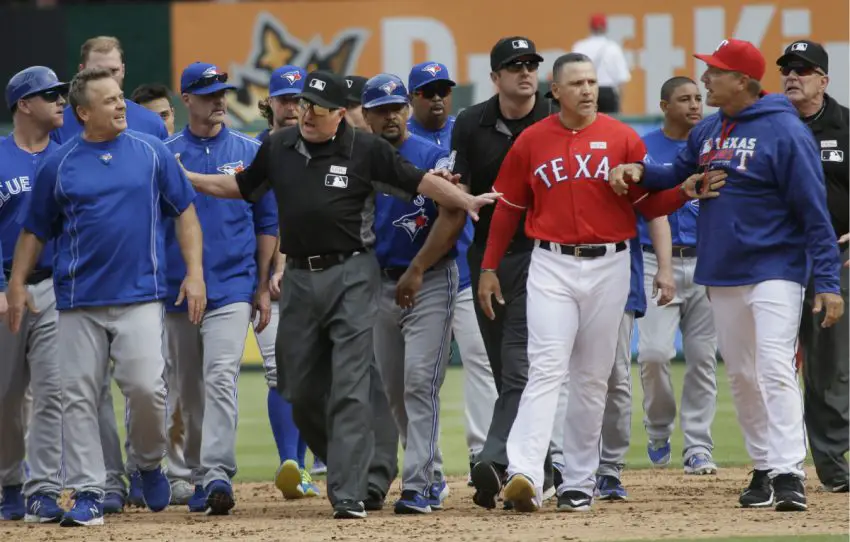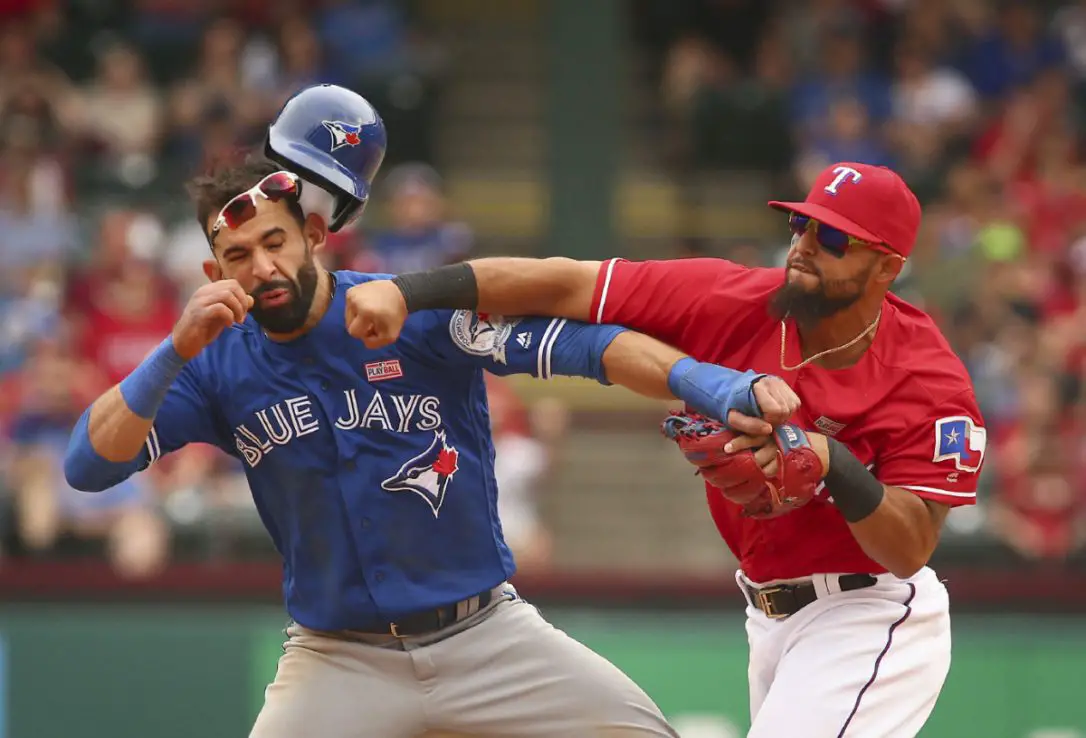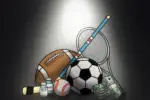Playing the Game
In sports that have as many unwritten rules as written ones, enforcing those codes of conduct can be tricky.
By Ben Zhang, Duke University
Suppose that someone you know does something that you don’t like; what do you do?
For starters, you could send them an email or message them on Facebook regarding the behavior you find undesirable. Perhaps you might approach the offending individual in person or ask to schedule a face-to-face meeting.
Alternatively, you could try throwing a ball at them at over ninety miles per hour.
As silly as that last option may seem, Major League Baseball players embrace it wholeheartedly. In 2015, for example, Toronto Blue Jays right fielder Jose Bautista made waves for his epic bat flip against the Texas Rangers during the American League Division Series. The next year, the Rangers decided to get back at their newly minted nemesis. In Texas’ final matchup with the Blue Jays, pitcher Matt Bush hit Bautista with a fastball. Two batters later, Bautista slid hard into second base, causing him to be socked in the face by Rangers second baseman Rougned Odor. The ensuing benches-clearing brawl led to several players on both teams receiving suspensions.

Amazingly, the madness continued even after the fracas finally died down. The very next inning, Blue Jays pitcher Jesse Chavez plunked Texas first baseman Prince Fielder with a pitch, resulting in his ejection from the game. A fight, a controversial slide and an unceremonious early shower—all of these resulted from one team deciding to hold a grudge for seven months after a man celebrated “too much” for hitting a series-winning home run.
Welcome to the strange world of baseball, where the players attempt to keep each other in check using a series of unwritten rules. Such self-policing, as previously mentioned, often comes down to throwing at opposing teams’ players or starting fights. The motivations behind these actions are generally blameless. As retired infielder Greg Dobbs once said, “When you hit a homer, flip your bat, walk 10 feet toward first base and stare at the pitcher, showing bravado, you are disrespecting the other team, your team and the name on the front of jersey. That’s the worst thing you can do.”
Encouraging people to not show off and play the game the right way is almost always the right course of action. There have to be limits, however, to the ways in which this encouragement is manifested. Sure, maybe throwing at someone’s head, as the Boston Red Sox recently did to Baltimore Orioles third baseman Manny Machado, may seem like a good way to send a warning. But what if Machado had been hit in the head and injured? Even worse, what if the severity of the injury had forced him to cut his career short? Such an outcome would be highly undesirable, especially if it resulted from an act of retaliation.
The trouble with unwritten rules is that they are often vague and can be interpreted in a variety of ways. Some players, for example, feel that you shouldn’t steal a base or swing at a 3-0 pitch when your team is up big. But exactly how large of a lead must you be sitting on before the rule kicks in? Some players use a complicated formula involving “runs ahead” and “outs left,” but it relies on adjustments for different stadiums that are inherently subjective. Of course, you could also make the point that players shouldn’t ever hold back, as theoretically no lead is safe, but that’s an argument for another time.
Unwritten rules can also lead to some rather contradictory and hypocritical situations. Take the Blue Jays/Rangers anecdote from earlier. Sure, Chavez deserved to get thrown out of the game for endangering the safety of the opposing team’s players. But, under that logic, Bush should have been tossed as well, especially since he was the one who started the whole mess in the first place. And for a good illustration of the confusing home run celebration debate, check out this quote from pitcher Brandon McCarthy:
“If Manny Ramirez hits a home run and does his thing at the plate on the bases, well, he’s Manny Ramirez. He can do that…but when Ronnie Belliard, who swings just like Manny and does the same thing as Manny after he hits a home run, it’s not the same because he’s not Manny…to me, it’s just so arbitrary.”
Baseball’s unwritten rules are a great example of an attempt to preserve good sportsmanship gone awry. A look at the world of golf might shed some light on how to effectively enforce fair play. Golf players are famous for their adherence to the rules, sometimes in truly remarkable ways. The story of Jason Millard is a good example. In 2014, while attempting to qualify for the U.S. Open, Millard may have ground one of his golf clubs in a bunker, though he wasn’t quite sure. As no one noticed, most people probably wouldn’t have given the situation any further thought, but Millard did, even after he successfully qualified for the Open. Five days later, he disqualified himself for his failure to call a penalty.
Millard’s tale is surprisingly not unique or even particularly uncommon. In 2012, Blayne Barber willingly took himself out of the qualification process for the PGA Tour. His crime? Penalizing himself one stroke, not two, for possibly brushing a leaf in a bunker. If that seems unduly harsh, keep in mind that the rules are the rules. And those who might suggest that Barber and others should have simply kept their mouths shut don’t understand the history of sportsmanship in golf. As former LPGA Tour member Meg Mallon once put it, “That’s just the way the game is. It started as a gentleman’s game, and it has kept going. You learn that it is a badge of honor to play the rules and call penalties on yourself. It is a game of integrity.”
Indeed, golf players past and present, young and old, seem to understand that they are called on to abide by the rules. After Aussie legend Greg Norman disqualified himself from a tournament for using an improperly-stamped golf ball, Tom Kite said, “I don’t think you’ll see that in other sports. People set those standards long before us, and it’s expected of us. And we expect it from the younger players.” Mark Wilson, after narrowly winning a tournament despite self-reporting a penalty, related, “I don’t think I would be here if I had not called it on myself because I would be thinking about it, and if I had not called it on myself, every time I look at the trophy, it would be tarnished.”
Even fourteen-year-old golfer Zach Nash disqualified himself after winning a junior tournament, saying, “I knew right away I couldn’t live with myself if I kept this medal.” Without knowing, he was following in the footsteps of the great Bobby Jones, who, after being lauded for calling a penalty on himself at the U.S. Open (which he narrowly went on to lose), exclaimed, “You might as well praise me for not robbing banks.”
So, if people want to encourage good sportsmanship, they should look to create a culture of honesty.
Golf players grow up being taught to do the right thing, and they know they will be heavily criticized for failing to meet the standards of fair play. Over time, such healthy peer pressure forges players who are willing to sacrifice wins for the sake of preserving the integrity of the sport. On the other hand, baseball players try to control others through fear, mostly that of being hit. Small wonder, then, that the system still has so many kinks.
Former catcher John Baker once said that in baseball, “There’s not a platform for retaliation when you’re frustrated or upset.” Hopefully, if his sport and others make an effort to adopt the ways of golf, there won’t need to be.


















[…] https://studybreaks.com/culture/sportsmanship-2/ […]